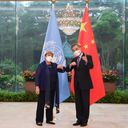Advocates denounce UN official's China visit as "ultimate betrayal"

Genocide scholars and rights advocates are calling for the resignation of a top United Nations human rights official after her visit to Xinjiang ended with her repeating, rather than denouncing, Chinese government propaganda about an ongoing genocide there.
Why it matters: The visit illustrates how the UN is caught between China and the West, and it suggests Beijing increasingly holds sway over the organization.
- "Beijing has already spun this trip as a huge success and an affirmation of their policies. It's bringing the entire UN into disrepute," said Azeem Ibrahim, a director at the D.C.-based Newlines Institute for Strategy and Policy, which recently published a report about the genocide in Xinjiang.
What's happening: Over the weekend, UN High Commissioner for Human Rights Michelle Bachelet completed a trip to China that included a visit to the northwest region of Xinjiang, where the Chinese government has detained more than 1 million Uyghurs and other minority ethnic groups as part of an ongoing genocide.
- It was the first visit of a top UN human rights official to China since 2005. The Office of the High Commissioner for Human Rights first requested this visit in 2018 as reports of mass detentions in Xinjiang emerged.
- Extensive evidence from satellite imagery, Chinese government documents, and survivor testimonies indicates Chinese authorities have used mass detentions, forced sterilization, forced labor, mass incarceration, family separation, torture, surveillance, political indoctrination, and bans on religious and cultural practice to stamp out Uyghur identity.
But at a May 28 press conference in Beijing, Bachelet used Chinese government talking points to frame her remarks on Xinjiang, casting the policies there as a form of "counter terrorism" intended to combat "violent acts of extremism." She also referred to mass detention facilities as "vocational and educational training centers," the government's euphemism for the camps.
- She did not denounce the genocide or demand that the Chinese government end its repression of Uyghurs and other ethnic groups in the region.
- She also praised the Chinese government's achievements in poverty alleviation and health care in other parts of the country.
- Bachelet mentioned she had spoken with Uyghurs outside China who had "lost contact" with their detained relatives; the commissioner urged Chinese authorities to provide "information" to the relatives of detainees but did not call for their release.
China's propaganda apparatus hailed the visit as a global stamp of approval on its Xinjiang policies.
- Chinese state media ran photos of Bachelet bumping elbows with Foreign Minister Wang Yi and touted her visit as "an opportunity to observe and experience first-hand the real Xinjiang."
- Bachelet's visit "[n]ot only vindicated, but justified" China's human rights model, Zha Liyou, consul general at the Chinese consulate in Kolkata, posted on May 30.
- Bachelet's office did not respond to a request for comment.
What they're saying: Human rights advocates and Uyghur activists were stunned and swiftly condemned Bachelet's actions.
- "If the one institution that was supposed to stand by us ended up aiding the Chinese government’s own narrative, what more could we do to change the victims’ lives?" said Rayhan Asat, a human rights lawyer and Yale law fellow whose brother is detained in Xinjiang, calling this the "ultimate betrayal."
- The institution of the High Commissioner for Human Rights is now "badly compromised," said Frederick John Packer, a professor of law at the University of Ottawa who served on the drafting committee secretariat at the 1993 World Conference on Human Rights, where the plan to establish the post of High Commissioner for Human Rights was created. Packer said he was "still in shock" at how the visit had turned out.
- "The world cannot afford this," he said. "She must resign along with those who advised this awful course."
The Campaign for Uyghurs, a D.C.-based advocacy group, also demanded Bachelet's resignation.
- "Bachelet neglects the duties of her office, her mandate to the world to stand up for human rights, and the UN’s founding principles," the group said in a statement.
Background: Before the trip, government officials and rights advocates around the world warned that Chinese authorities would heavily orchestrate the visit and deny Bachelet and her team the access needed to conduct their investigation.
- Chinese authorities said Bachelet and her team would only have contact with a limited number of carefully selected people to help guard against COVID infections.
- On May 20, a group of 40 legislators from 18 countries, including the U.S., Germany, France, Lithuania, New Zealand and Japan, warned that Chinese authorities planned a "Potemkin-style tour" and criticized Bachelet for going through with the visit without securing promises of unrestricted access.
- "The UN should never undertake any of these trips unless it is under conditions that they specify, and not conditions that are dictated to them," Ibrahim said.
What to watch: Back in December, Bachelet's office promised to soon release a report on conditions in Xinjiang. That report has yet to be released.